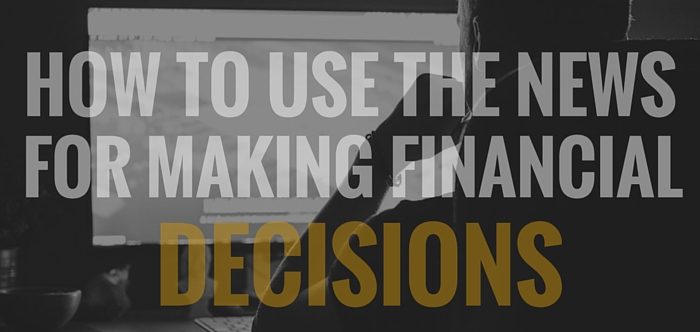How to Use the News for Making Financial Decisions

What do you do when you hear economic stories in the news?
Oil Prices! China’s economy! Stock market fluctuations! Jobs reports!
What should you do after hearing about these?
A natural reaction
Regardless of what you should do, it turns out that there’s one thing everyone actually does right after they hear about these topics: sweat.
A few years ago my colleague Joel Reimer helped conduct a study at the Institute of Financial Planning at Kansas State University. He and the other researchers found that almost everyone starts sweating more just by hearing news stories about finances or the economy. Many of the study’s subjects didn’t even realize it was happening. It didn’t matter whether the story was positive or negative, just bringing up a money headline made everyone start freaking out a little, often without even realizing it.
It turns out that when we hear information, our brain can’t help but try to decide what to do with the new info. And since most of us don’t know what to do with the economic and financial news we get, our natural stress levels rise.
A diet problem
It doesn’t help that the media feeds us a particular type of news diet that may not be the healthiest for us (one of my financial advisor friends calls this “money porn”). Media outlets produce content that sells. And what sells is not usually solid, old-fashioned wisdom.
Most news outlets tend to report stories that are:
- Sensational: Because “NORMAL, GOOD DAY ON WALL STREET; NOTHING HAPPENED” doesn’t usually generate clicks or ongoing conversation.
- Single-sided: How many times have you felt let down after hearing a story about a topic you’re knowledgeable about, particularly if you have a different point-of-view than the reporter?
- Short-term: When it comes to money issues, this is particularly important. Headlines are all about what’s happening today: today’s markets, today’s jobs report, today’s new study.
Focusing on the issue du jour can cause our financial lives to be a series of knee jerk reactions to whatever is being paraded before us.
And have you ever noticed that it seems like the world is bouncing from one near-cataclysmic apocalypse to the next? I’m not trying to discount ISIS, or deny that the “Great Recession” impacted a lot of people. I’m just pointing out that it’s incredibly difficult to tell the difference between the “BIG DEALS” that matter and the “BIG DEALS” that don’t.
So what should you do?
Your personal money plan should not hinge on you being able to predict the future. In my job as a financial planner, I see that the people who try to do this are usually the ones who make emotional decisions at the worst possible times.
Those that are successful build a financial plan that is mostly independent of what today’s markets or politics are doing. A long-term focus is needed for planning.
So I’ve come to the conclusion that what you should probably do is turn the news off. It’s not really going to help you do the one next step you really need to do. I don’t know what your one next step needs to be, but for a lot of people there really is one thing. Yours might be saving more, or controlling expenses, or diversifying investments. But I would wager that for almost all of the people that come in my office, that one step remains the same whether China’s economy or the price of oil goes up or down.
So really, next time you hear a story about the economy or the next bubble that will burst and wonder what you should do, turn the news off. And then focus on the one next step that will move you forward.
< Back to Updates

